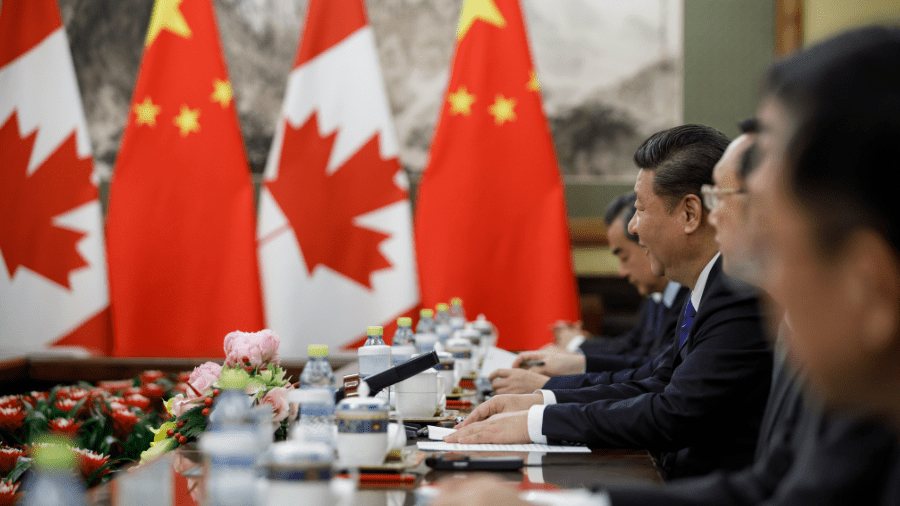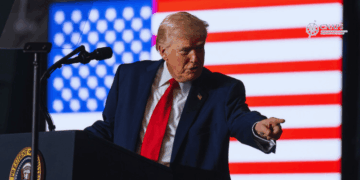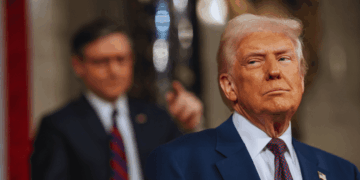This article has been adapted from a briefing delivered to staffers of the House Select Committee on Strategic Competition Between the U.S. and the Chinese Communist Party on November 7, 2023.
By Charles Burton, November 8, 2023
In official statements the Government of Canada has defined China as an “increasingly disruptive global power.” But, practically speaking, the Canadian government believes it can adopt what it regards as a sophisticated approach by paying lip service to the concerns of our allies over the China threat on the one hand, and on the other, reassuring China that Canada will make no substantive policy changes that would negatively impact the status quo of Canada-China relations on Chinese terms.
A senior official in Canada’s foreign ministry indicated to me that the Canadian Government’s priority is still to enhance engagement with China. She said that “China is a disruptive power, but that is not necessarily a bad thing.” She then continued saying that after all, “the internet was also a disruptive force when it came out.”
There has been no move to revise Canadian legislation on the illegal transfer of classified technologies to agents of a foreign state up to the modern standards of comparable US, UK and Australian law.
The result is that Canada is open country for the transfer of dual use military technologies to China as these agents cannot be successfully prosecuted in Canada.
The Globe and Mail reported in January that 50 Canadian universities were involved in extensive research since 2005 with China’s main military university, including research on topics such as quantum cryptography, photonics and space science. Some of the Chinese military scientists who were involved were experts in missile performance and guidance systems, mobile robotics and automated surveillance.
Starting in the fall of 2022, Global News and the Globe and Mail published a series of reports on classified Canadian intelligence assessments and reports leaked to their reporters alleging that serious threats to the integrity of Canada’s democratic institutions have been carried out by Chinese state actors.
They detail that there is Chinese government coordinated interference in the Canadian political system at all levels of government through illegal funding of pro-China candidates and coordinated campaigns of disinformation to discredit candidates deemed hostile to China.
They also outline a lot of other Chinese state-coordinated nefarious activities, including attempts to intimidate politicians of Chinese origin with family in China.
In March of this year, an anonymous opinion piece was published in the Globe and Mail, the author said to be the primary leaker of the secret materials to Globe and Mail reporters Steven Chase and Robert Fife.
The anonymous author provided the following explanation for his actions:
“When I first became aware of the significance of the threat posed by outside interference to our democratic institutions, I worked – as have many unnamed and tireless colleagues – to equip our leaders with the knowledge and the tools needed to take action against it. Months passed, and then years. The threat grew in urgency; serious action remained unforthcoming. I endeavored, alone and with others, to raise concerns about this threat directly to those in a position to hold our top officials to account. Regrettably, those individuals were unable to do so. In the time that passed, another federal election had come and gone, the threat of interference had grown, and it had become increasingly clear that no serious action was being considered. Worse still, evidence of senior public officials ignoring interference was beginning to mount. . . I hoped that by providing the public with information I believe to be in the interest of all Canadians, we as a country would begin a much deeper conversation about what it is that we expect of our government.”
More secret documents released last month show that the Canadian Security Intelligence Service has expressed concern about Canada’s passive response to China’s influence operations. One document prepared for a CSIS briefing with Trudeau and dated Oct. 26, 2022, said there are “no consequences” for foreign interference in Canada.
Canada has also made no movement to initiate legislation comparable to your Foreign Agents Registration Act.
The Australia specialist in Chinese influence operations in Western nations, Clive Hamilton, was asked in a Canadian newspaper interview “Some experts suggest the problem of Chinese soft-power interference is much more pronounced in Australia and New Zealand than here. Do you agree?” His answer is revealing. Hamilton said: “I think it’s more of a problem in Canada. Yes, Australia’s economic dependence is higher — in terms of trade — but when I look, as I have been doing, at the subtle but intense influence of China on Canadian institutions — parliaments, provincial governments, local governments, universities, the intellectual community, the policy community — it makes me deadly worried. I’ve met some very well-informed Canadians who aren’t sure Canada will be able to extricate itself from this situation. I have also been dismayed by the brazenness of friends of the Chinese Communist Party and their activities when I was last in Canada — in Ottawa, a few months ago — I was pretty dismayed at the extent of Chinese Communist Party (CCP) influence in the federal Parliament.”
The explanation for Canada’s passive approach to PRC malign activities in Canada is apparent: Canada has a high degree of elite capture by the PRC.
Just a couple of weeks ago reports came out that Chief of Defene Staff General Wayne Eyre wrote an introduction to document entitled The Pan-Domain Force Employment Concept.
In it he wrote “We must remember that Russia and China do not differentiate between peace and war. The hostile intentions and actions of our adversaries show that they consider themselves to be at war with the West. We must accept this reality and respond accordingly.”
This insightful position is very much at odds with the current Canadian Government who endorse views such as “engagement and strategic empathy” with the PRC as the way forward for Canada-China relations.
They hold forth that the growth of Chinese power is inexorable, and China is vengeful and dangerous if provoked. Moreover, America is the past, China is the future, so Canada must get on the right track because “if you can’t beat them, join them.”
There are significant challenges in gaining Canadian compliance with U.S.-led action to respond to the challenges that China clearly poses to the international rules-based order and the integrity of our democracies.
Charles Burton is a senior fellow at the Macdonald-Laurier Institute, non-resident senior fellow of the European Values Center for Security Policy in Prague, and former diplomat at Canada’s embassy in Beijing.








